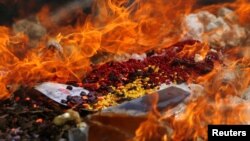Prime Minister Hun Sen called on Cambodian cultural figures and officials to step up the campaign against illegal drugs in a public letter released this week.
The premier published the letter on Wednesday, international anti-drugs day, and as well as speaking to anti-drugs officials he appealed to artists and performers to disseminate educational messages about the harm drugs can cause.
The letter said that Cambodia had stepped up efforts to combat the illegal trade in narcotics, amphetamines and synthetic drugs, providing education to some 160,000 people and treatment and rehabilitation to about 7,000 over the past year.
In a separate address, Ke Kim Yan, the deputy prime minister and head of the national anti-drugs agency, told attendees at the international anti-drugs day celebrations that the spread of illegal substances had increased in recent years, which was a “worrying and challenging issue” for the Cambodian authorities.”
Gen. Meas Vyrith, secretary-general of the National Authority for Combating Drugs, told VOA on Tuesday that new types of drugs were entering the market and organized criminal groups from China, Iran, Mexico and African nations were gaining clout.
“These groups are the groups that we pay attention to with regarding to their travel from one country to another,” he said.
“We continue to investigate to curb the groups from organizing plots to transport drugs from production sites to the markets of consumption,” he added.
However, Yong Kim Eng, president of the People Center for Development and Peace, said urgent reforms were needed to reduce the spread of addiction.
He said the various anti-drugs agencies in Cambodia should be merged into a single unit and receive training to analyze illegal substances at the local level.
“The communes should take the lead in the crackdown on drugs. That’s the only way we will eliminate drugs,” he said, adding that more drug rehabilitation centers would also help.
“People not involved with drugs are vulnerable because if we fail to curb it on time, there will be more victims falling into drug use, which will cause further pain to families and society.”




